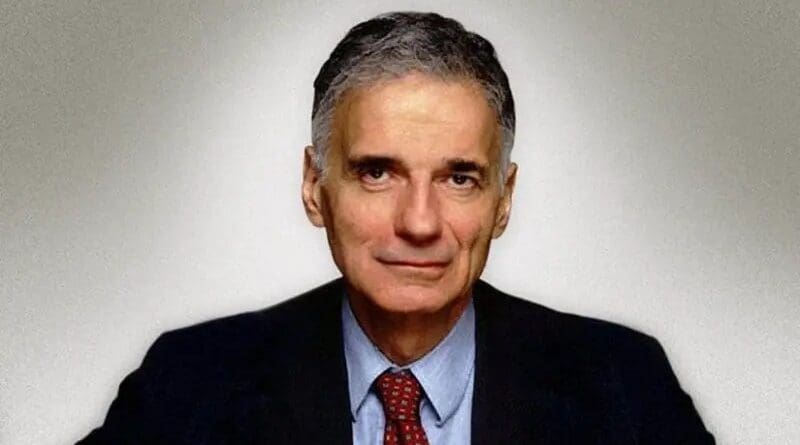Ralph Nader: Fracking’s Lure, Trap And Endless Damage – OpEd
By Ralph Nader
Say what you will about Yoko Ono’s art, there is no denying that she is unique. Who else will put several $100,000 full-page notices in The New York Times displaying only the word “Peace” or “Imagine Peace” in small type with the rest of the page blank? No elaboration, no examples of the ravages of war or mention of people “waging peace” around the country and world. Inscrutable, yes. Effective, who knows, except maybe Yoko Ono?
Well, in the December 10th issue of the Times there appeared a most un-Yoko type message. And this one wasted no space with the headline “Governor Cuomo: Imagine there’s no fracking.” The ad, commissioned by her and her son Sean Lennon, contained a graphic case against fracking designed to get New Yorkers to urge the governor to ban fracking and make permanent the moratorium first established by former N.Y. Governor David Paterson. The moratorium was in place pending further scientific studies regarding the environmental and health impact of drilling deep into the Marcellus Shale deposits underneath a large portion of the state.
The gas companies are putting heavy pressure on Gov. Cuomo to join Pennsylvania, which is already suffering the ravages of fracking. Landowners in Pennsylvania and in other permitted states now realize that their water was contaminated by chemicals used in the fracking process and leaked natural gas from fractured shale deposits.
There also exists a formidable coalition of government officials, physicians, scientists at Cornell, civic groups, farmers and other diverse opponents fighting against this hydrofracking. The relentlessly-factual Walter Hang, President of Toxics Targeting in Ithaca, New York, is one of the most effective environmentalists opposing fracking.
Of course, on the other side are the oil and gas industries pursuing profits, landowners seeking royalties (though the fine print contracts may rise up to bite them), and upstate laborers hoping for employment. The gas industry publicists, who exaggerate the benefits to the local economies, ignore the short-term nature of most of the jobs and the costly toxic air, water and land destruction fracking leaves behind.
The fight against fracking in New York is like the recurrent struggle put on by the taxpayer-subsidized fossil fuel and nuclear industries that want to dominate energy policies in government and push the safer alternatives out of the way because energy efficiency and renewable energy don’t make profits for them. As Yoko and Sean point out, through their new group Artists Against Fracking, by insulating buildings, for example, they could “save far more energy and create far more jobs than fracking can produce, plus save consumers money forever.”
Industry engineering manuals portray the immense complexity of fracturing technology, the huge amount of water used per well, the pipelines and compressor stations, the congested truck traffic, the dozens of chemicals needed in the water to draw out the gas vertically and horizontally under the surface of the land. These materials leave out the emerging, grim reality which is memorably portrayed in the documentary “Gasland” by Josh Fox.
Hydrofracking, whose side effects haven’t been fully vetted, is a new industrial way of obtaining natural gas. Instead of seeking these deposits, alternative energy sources should be pursued. Think of solar energy, dutifully, naturally providing most of the energy needed, from absolute zero, to make the Earth habitable. The rest is up to Homo sapiens – a species that must be giving Mother Sun the fits over not adapting its energy for efficient, safe daily uses.
We need to remember Ben Franklin, our frugal forebear who coined the phrase “a penny saved is a penny earned.” Today he would say “a trillion BTUs saved is a trillion BTUs earned.” The problem is that reducing waste – and despite progress, we are far less energy efficient than Western Europe or Japan – is not encouraged by present perverse market and regulatory incentives.
Germany is way ahead of us in both energy conservation and renewable energy. There, nuclear power is being phased out. And, price is used to discourage use of fossil fuels. There is also growing support for a carbon tax in this country including some leading corporate chieftains, but the message hasn’t reached the lawmakers in Congress. Too many of them are marinated in oil.
Your tax dollars helped develop fracturing technology which, if not stopped, will unleash its furies all over the world. There are hydrocarbons everywhere. Methane, among other gases, will be released in excess, which is many times worse a greenhouse gas than carbon dioxide. The regulators are not keeping up.
But the sun is everywhere in many forms – solar thermal, solar photovoltaic, passive solar architecture, wind power, wave power, non-corn biomass that doesn’t compete with food supplies and raise food prices. As I said years ago, “If Exxon owned the sun, we’d have solar energy very quickly.”
Therein is the rub. What is best for a planet with a decentralized, job-producing, safe, efficient, inexhaustible form of energy (at least for 3 billion more years) does not yet have the political muscle to go to the top of the U.S.’s energy priority ladder. The concentrated profits and the limited energy infrastructure are in the grip of the Chevrons and the Peabody Coals.
But history is not on their side. Countries with minimal fossils fuels are leading the way with renewables. Post the Fukushima disaster, Japan is upping the ante on conservation and renewables. Climate changes and natural disasters will wake up the rest of the world. Let’s act to make it sooner rather than later.
The latest bulletin (toxicstargeting.com/Marcellus_Shale) from the indefatigable Walter Hang alerts people to protest that the State Department of Health review is now “being conducted in total secrecy without any public participation.” He believes Mr. Cuomo will make his decision within three months and urges you to call the Governor’s office at 518.474.8390 or 212.681.4580.

